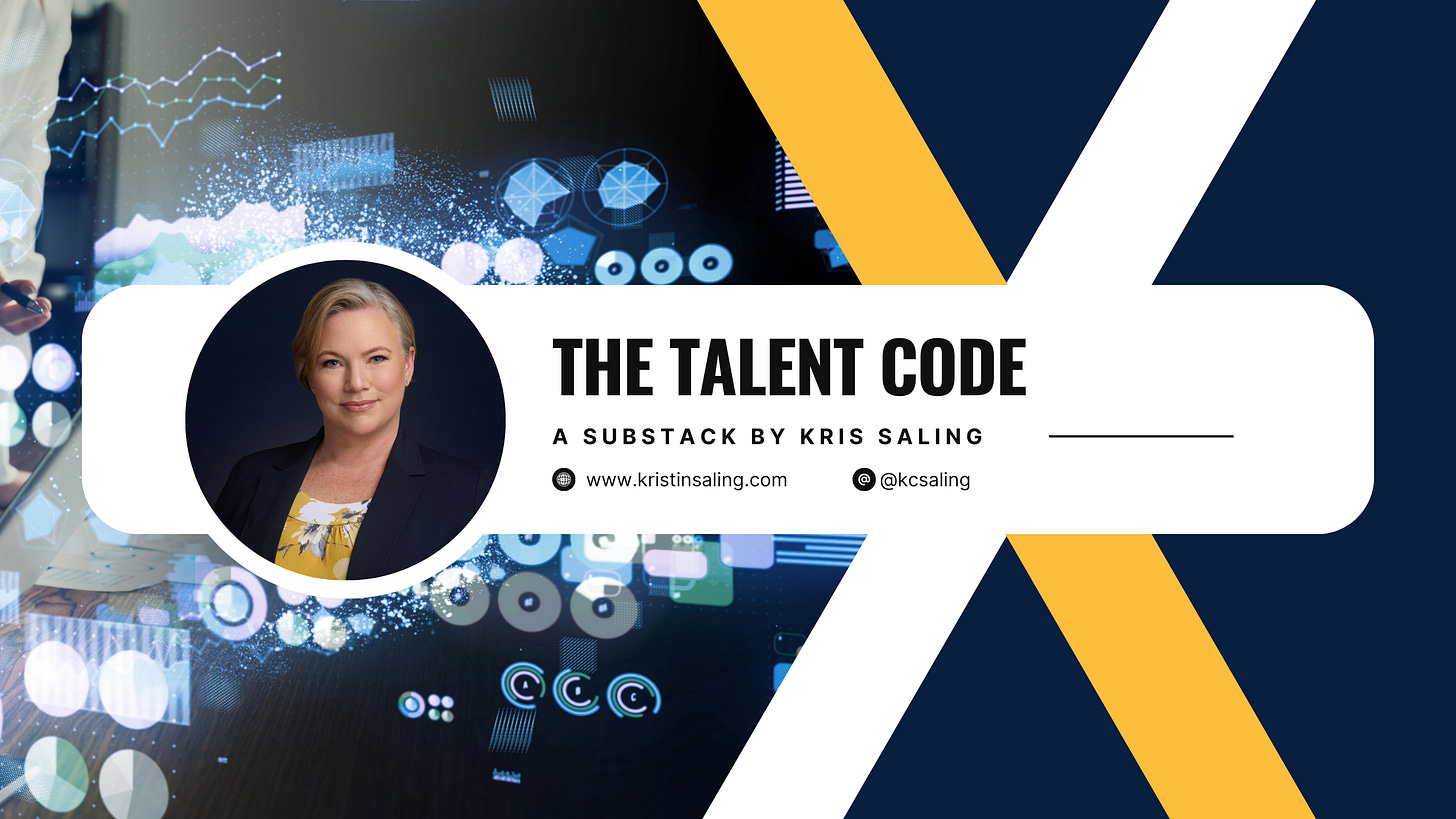Evolving Requirements in Leadership
What to Expect from your Managers when Everyone is a Manager - of AI
It’s been a busy few weeks—wrapping up and winding down a busy conference schedule, shifting back into the deep work of AI and workforce strategy, and tackling some of the big changes and reorganizations rolling through the Pentagon. I capped it all off with a week at Fort Knox, where I had the chance to get some hands-on perspective with how we’re currently applying leadership, experience, and judgment across the Army’s people enterprise.
And I have to say—what stood out most wasn’t just what we were doing, but how we were thinking. I was both pleased to hear the folks I was working with talk about what we could do to automate things in this space, and how AI could improve what we were doing. At the same time, I recently read an interesting piece on Decrapify Work on the symbology being used in things like the iPhone and that the icon of choice for AI seems to be a magic wand.
The author, Colin Newlyn, asks “Do we really want to surrender our autonomy to magic? Is that why many people are scared of AI, and even actively shunning it or sabotaging it?”
It’s got me thinking about the role and expectation of managers and leadership as AI and automation is increasingly expected to come handle tasks for us. Managers today are no longer just taskmasters overseeing human employees—they have to be technically proficient enough to collaborate smartly with AI systems.
This shift calls for a kind of leadership that emphasizes coaching, emotional intelligence, adaptability, AND an understanding of the strengths and weaknesses of the technology, and strategies (not necessarily new, but more adaptive) for equipping leaders with the skills they need to thrive in this rapidly changing technical landscape.
Let’s decode it.🚀
Evolving Leadership
Adapting to the Age of AI and Automation
As work evolves with the integration of AI and automation into business operations, leadership and management must also evolve. Management has largely been about directing people, setting tasks, and making decisions.
Today, with AI tools increasingly stepping in to handle routine tasks, data analysis, and even aspects of decision-making, the role of human managers is evolving into something far more dynamic. Here are some key trends we're seeing.
1. From Taskmasters to Coaches: A Shift Toward Development
As AI tools automate routine tasks and handle increasingly complex workflows, managers are freed up to focus on higher-level strategic tasks. This creates a shift from a focus on micromanaging tasks to nurturing talent, providing mentorship, and helping teams navigate uncertainty.
Managers are expected to be coaches, guiding their teams in developing critical thinking, creativity, and interpersonal skills—things AI can't (yet) replicate. Leadership is becoming more about fostering growth, helping teams harness AI's potential, and supporting individuals in building skills that are uniquely human, such as emotional intelligence, ethical decision-making, and adaptability.
2. Human-Centric Leadership: Leading with Empathy and Purpose
As AI and automation streamline many traditional management tasks, there’s a growing emphasis on human-centric leadership. Managers are expected to lead with more personalization and empathy, understanding the individual needs and growth trajectories of their team members, and providing the support that AI can't offer.
This human-first approach is a critical part of creating an environment where teams can thrive. Managers are now seen less as enforcers of process and more as advocates for well-being, work-life balance, and personal development, cultivating a culture of trust, collaboration, and continuous learning.
3. Collaborating with AI: Managers as Partners, Not Supervisors
The lines between human leadership and AI partnership are blurring. In today’s workplace, nearly everyone is managing some form of AI tool or automation system. The role of the manager has expanded beyond just overseeing human employees to also include partnering with AI systems, ensuring these tools are integrated effectively, and addressing any ethical concerns.
Managers are increasingly called upon to have a nuanced understanding of AI tools, not just from a technical perspective but also in terms of how to leverage them in ways that enhance human potential and preserve the human touch in areas like team dynamics and organizational culture. This creates new expectations for managers, who must now be able to balance human interaction with AI-driven efficiency.
4. Continuous Learning and Adaptability: The Need for Agile Leadership
With the tech changing and growing as rapidly as it is, often in surprising directions (any other complexity scientists out there nerding out over all the emergent behavior we’re seeing?), leaders must also be agile and adaptive. The ability to adapt to new tools and processes is crucial. Managers need to set and encourage a growth mindset within their teams, encouraging experimentation, learning from failures, and continuously evolving in response to new technologies.
As AI evolves, so too must the leadership competencies required. Because the tech isn’t static, your leaders can’t be, either. They need to be lifelong learners and keep on top of current tech capabilities, anticipating the impact of new tools and systems on business operations, and training their teams to adapt to changes in the landscape.
How can we best create these capabilities?
Strategies for Developing Leadership Skills in the Age of AI
To navigate this shift, here are some ways you can proactively help your managers grow their leadership skills around adaptability and technology.
1. Invest in Leadership Development Programs Focused on Emotional Intelligence
As AI handles more tactical tasks, soft skills become even more essential. Training managers to develop emotional intelligence (EQ), empathy, and resilience will help them effectively manage teams in an AI-powered workplace. EQ is crucial for navigating the complex human interactions that AI can’t (yet) address.
2. Provide Training on Collaborating with AI
Leadership training should include how to effectively partner with AI systems. This involves understanding the capabilities of and how to integrate AI tools, ensuring data ethics are maintained, and knowing when to intervene in automated decisions. Leaders who understand how to work with AI will be better positioned to harness its benefits and lead their teams through change.
3. Encourage Cross-Disciplinary Learning
Leadership in the age of AI requires a blend of technical knowledge and human-centric skills. Encouraging cross-disciplinary learning—such as a combination of management training and courses on AI ethics, data science, or machine learning—will equip leaders with the right balance of capabilities. Leaders who understand both technology and people will be better equipped to make decisions that are both informed and empathetic.
4. Foster a Growth Mindset and Adaptability
Managers should be taught the importance of being adaptable and flexible in an ever-changing workplace. A growth mindset encourages them to see challenges as opportunities for learning. This mindset is particularly important in the context of AI, where technology is constantly evolving. Empowering managers to adopt this mindset will ensure they remain agile in leading teams through technological disruption.
5. Create Space for Feedback and Reflection
Leadership in the AI age isn’t just about telling employees what to do; it's about being a reflective leader who fosters collaboration. Creating regular opportunities for feedback and reflection, whether through one-on-one check-ins or team retrospectives, will ensure that managers stay attuned to their team’s needs and challenges while also continuously learning themselves.
Assess and Evaluate
As AI and automation tools reshape the landscape of work, the role of the human manager evolves as well, and while these strategies will help you figure out where to grow and adapt, the most important thing to remember is that it’s not stagnant. There won’t be one way of doing things that you can rely on—other than setting up programs to continually assess the environment and assess growth.
The future’s not set. We shouldn’t be either.
Talent Trends & Insights
Here are 5 things I’m paying attention to this week.
AI Coaching for Managers
Generative-AI “coaches” like Valence’s Nadia and CoachHub’s Aimy are being rolled out to support overwhelmed or inexperienced managers with real-time guidance on career planning, communication and team development—underscoring how leadership itself is becoming a hybrid human and AI competency.
Salesforce’s Internal AI Career Coaches Pilot
Salesforce’s Career Connect and Career Agent used AI to surface personalized career paths and training for employees with a focus on internal mobility. They largely achieved 74% engagement and 28% of employees applied for internal roles, highlighting how we can leverage AI to both empower talent and strengthen internal mobility.
Moderna Merges Tech & HR to Embed AI across Functions
By combining its technology and HR units and deploying 3,000+ custom GPT models (built with OpenAI) for everything from clinical trial design to talent workflows, Moderna illustrates how executive teams must rethink org structures to lead in an AI-first world.
AI-Powered Multi-Agent Resume Screening
New(ish) LLM-based, multi-agent approaches can provide pretty robust candidate assessments. Here’s how they work, and a few quick fixes that might make your resume jump to the top.
Addressing Skills Gaps
With 39% of employees' current skill sets expected to become outdated by 2030, companies are focusing on skill-based hiring and upskilling to ensure their workforce remains competitive.
Final Thought: Leadership is human
As AI continues to play a central role in the workplace, the essence of leadership remains undeniably human. But the future will be defined by those who can blend the best of both worlds—leveraging AI as a tool for efficiency, while leading with empathy, creativity, and vision. Now, more than ever, our ability to coach, develop, and inspire others AND understand the proper application of the technology will determine how we truly evolve in this age of automation.






